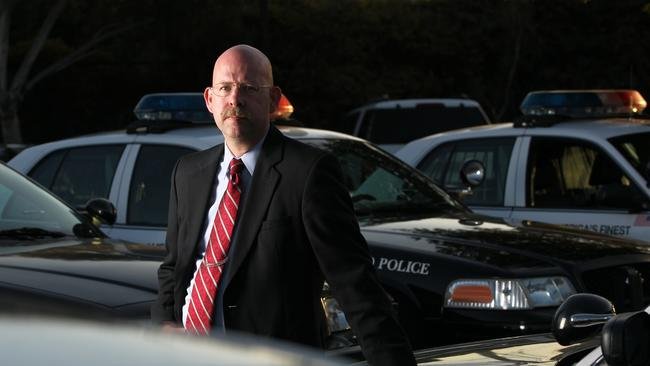By Kristina Davis
MARCH 18, 2010, 12:00 PM • SAN DIEGO
Wes Albers was writing long before he was a cop.
As a college student working mall security graveyard shifts, he’d pen short stories to stay awake.
They were sci-fi, fantasy and anything else that came to mind. “Star Wars” meets “Lord of the Rings.”
Decades later, as the veteran San Diego police officer considered writing seriously, he took the advice of his trusted editor and mentor: Write what you know.

Wes Albers, a detective sergeant in the Southern Division of the San Diego Police Department, drew on his law enforcement background in writing his first published novel, “Black & White.” (Sean M. Haffey)
The result is “Black & White,” Albers’ first published novel that goes on bookstands Tuesday.
The bespectacled detective sergeant drew on his 22 years in the department, including his formative years as a rookie in City Heights and the surrounding neighborhoods.
That is where his fictional story is set, as grizzled Officer John Hatch navigates the underbelly of San Diego’s Mid-City Division and becomes obsessed with solving a woman’s murder. Off the clock, the hardened officer struggles to maintain personal relationships that are strained by police work.
“There’s as much drama for me in not melting down as the meltdown,” explained Albers, 46, who currently supervises investigations in the department’s Southern Division, which sits along the U.S.-Mexico border.
“The high-pressure stuff they’re dealing with, how do you keep your soul intact when all day you’re dealing with people who are lost?”
San Diegans will no doubt recognize their city, from the main character’s home in Mission Hills and a date in the Gaslamp Quarter to a motorcycle ride on the San Diego-Coronado Bay Bridge.
The author insists the book is a work of fiction, although he admits to pulling bits and pieces from co-workers and incidents he’s witnessed on the job.
“I’ve read thousands of police reports, been to thousands of calls. Those experiences (in the book) resemble something I’ve been to,” he said.
Growing up in Minnesota, Albers dreamed of becoming a writer and filmmaker. He admired how Ernest Hemingway took on the struggles of the everyman in “The Old Man and the Sea,” and he devoured Don Pendleton’s 1970s pulp fiction series “The Executioner.”
While visiting a friend in San Diego, he applied to the Police Department, which at the time was known for having the highest mortality rate among officers in the nation.
After he was hired in 1989, he requested an assignment to the busiest area.
“I was 23 and invincible,” Albers recalled.
His writing took a back seat until years later, when he began meeting with a group of writers. He eventually became the director of the Southern California Writers Conference, which nurtures authors and helps prepare them for the business side of the book world.
It was with this support system in place that he began to write his first novel.
The first chapter took 40 minutes to get on paper.
“I knew I really liked the character,” Albers said. “He represents a lot of things, a lot of feelings of cops who have been around awhile.”
Hatch is a cop who is far from perfect, yet he strives to make the right choices each times he straps on his gun. He was trained by old-school cops, and he finds it hard to understand the new breed of younger officers. He often feels unappreciated by the public for the dangerous, gritty work, yet he loves the job so much he doesn’t care.
Albers wrote his novel late at night, sending off chapters to trusted friends and colleagues for feedback.
“We’d end up telling war stories to each other, and he’d end up incorporating a lot of those in the book,” said retired Sgt. Bill Frew, who worked with Albers in the Southern Division. “A lot of it is really spot on, for the background of a cop and what runs through your mind.”
Albers wrote the last 100 pages in a day. That was six years ago.
In hindsight, writing the book was the easy part. Getting it published was another story.
Over the next few years, he went through two agents and numerous rejection letters, followed in 2009 by the near collapse of the book publishing industry.
He shelved the manuscript, wondering if it would ever see print.
His hopes were resurrected during a chance meeting with a mid-sized Los Angeles-based publishing house, Zova Books, at last year’s annual writers conference.
Early feedback has been positive, he said, including a blurb by Police Chief Bill Lansdowne on the book jacket.
“Sgt. Wes Albers tells a story that might be all too real as it examines the thoughts and fears of a senior patrol officer who tries to find meaning in the sometimes terrifying and complex world he lives in, wearing a badge,” Lansdowne writes. “If you would like to experience what it is like to be a police officer in a big city, I would highly recommend that you read this book.”
Albers hopes to continue writing the Hatch character into more books, possibly having a second manuscript ready by this time next year.
When asked about the inevitable comparisons to San Diegan Joseph Wambaugh, perhaps the most well-known cop author, Albers said he would be flattered to get as much recognition. But he also doesn’t want to be typecast.
“There are other things I would like to write. I want to be known as an author, not as a cop turned author.”
Copyright © 2017, The San Diego Union-Tribune